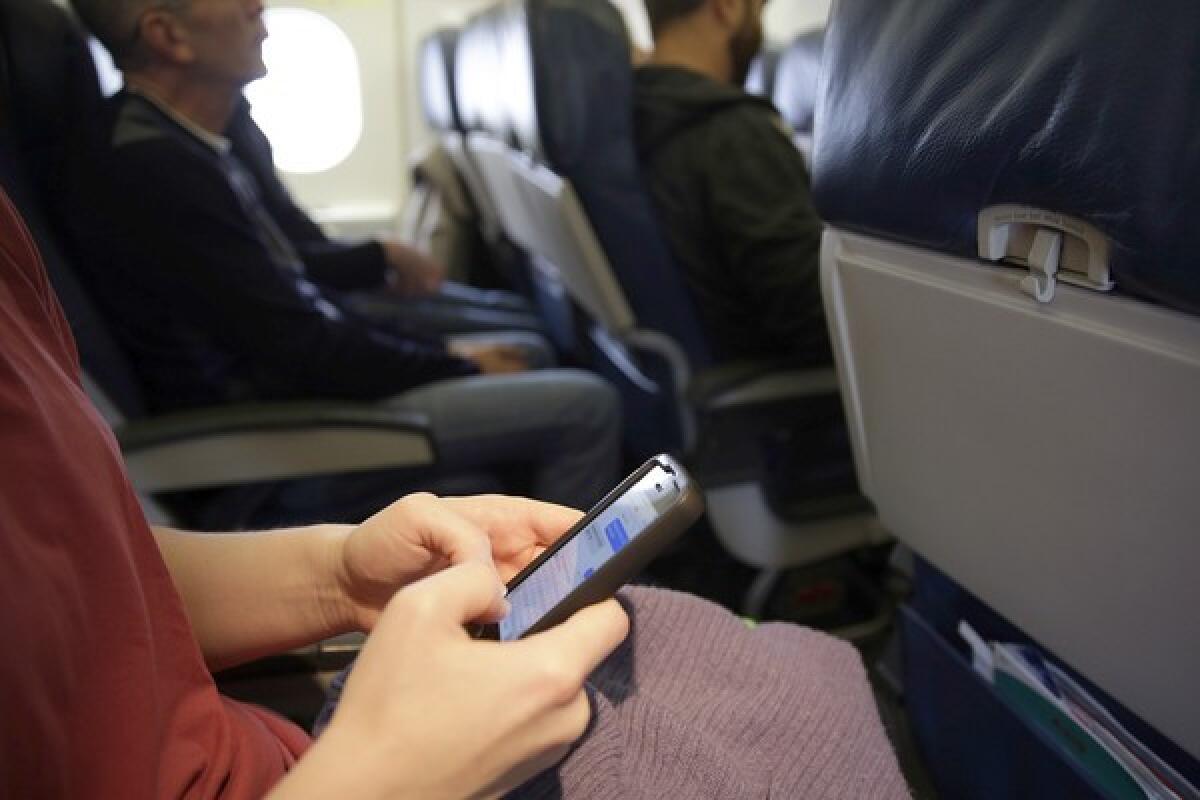FCC ban on in-flight cellphone calls may be lifted

- Share via
That screaming baby may no longer be the most annoying thing on your flight.
The Federal Communications Commission is considering allowing fliers to make in-flight voice calls on their cellphones once the plane reaches 10,000 feet. The practice has long been banned on domestic flights, even as other rules governing mobile device use on flights have eased.
The commission is scheduled to vote on whether to move forward with the proposal during a Dec. 12 meeting, according to two FCC officials who declined to be named because the plan had yet to be formally presented to the commission.
The idea quickly drew the ire of frequent fliers, flight attendants and industry analysts, who said allowing cellphone use on flights would be a nuisance that would be near-impossible to escape.
“This is one of the worst ideas ever,” said Henry H. Harteveldt, a travel industry analyst at advisory firm Hudson Crossing. “There’s no demand for this on the part of travelers, and there’s no need for it.”
Cody Evol is a lead designer at PayPal who flies as much as 100,000 miles a year, mostly for business trips. The 29-year-old said he was “definitely opposed to the idea because I think it’s terrible.”
“I get annoyed when people next to me talk on the phone at work sometimes,” the San Francisco resident said. “I can’t imagine being isolated on an airplane and having to deal with it.”
The ban was originally put in place because of potential interference to wireless networks on the ground, an outdated concern that an FCC official now says “can be successfully managed with modern technology.”
The FCC, which abandoned a similar proposal in 2007, cautioned that no decisions have been made, and that it could be months before the proposal goes to the commission for a final vote. If it is eventually approved, voice calls would still be prohibited during takeoffs and landings.
“It’s the start of a process,” the official said. “We think it makes sense to give airlines the tools to provide the services they want based on what their passengers demand.”
The Assn. of Flight Attendants, the world’s largest flight attendant union, urged the commission not to proceed with the proposal. The union noted that many polls and surveys conducted over the years found that a vast majority of the traveling public wants to keep the ban on voice calls in the aircraft cabin.
“Any situation that is loud, divisive and possibly disruptive is not only unwelcome but also unsafe,” the group said. “In far too many operational scenarios, passengers making phone calls could extend beyond a mere nuisance, creating negative effects on aviation safety and security that are great and far too risky.”
Those risks, it said, included passenger conflicts and the potential for cellphone use to drown out important loudspeaker announcements.
If the commission votes to move forward with the proposal next month, there would be a comment and reply period, typically lasting from 30 to 90 days, during which members of the public could voice their opinions on the matter online or via snail mail.
Once the public comment period is over, FCC staff would make a recommendation to the agency’s chairman and four other commissioners, who would then vote. There is no timetable for a final vote, the FCC official said.
If the agency ultimately approves a rule change, adoption and implementation would be left up to the individual airlines.
Some airlines are already mulling over the idea.
“We continue to monitor feedback on this topic from our customers and would consider it should the FCC make any changes,” said Brad Hawkins, a Southwest spokesman. But “our customers have told us that in-flight voice communication would be disruptive.”
JetBlue spokeswoman Cynara Charles-Pierre said the airline’s initial customer feedback indicated that people did not want the current ban lifted. “If the FCC’s new policy does go into effect, we would prioritize making the cabin comfortable and welcoming for all — for those who want cell service and for those who like peace and quiet.”
The proposal is the latest effort to expand mobile device use on airplanes.
Last month, the Federal Aviation Administration announced that it would ease restrictions on the use of portable electronic devices during takeoffs and landings. That decision allows travelers to operate devices such as tablets and e-readers throughout a commercial flight, but left in place the ban on phone calls.
Industry experts say both agencies seem to be giving in to the reality that many Americans aren’t happy when denied their beloved digital companions, which pose little threat to safety on a plane.
Virtually all adult airline passengers who travel with a portable electronic device carried at least one on board with them while flying in the past 12 months, with 69% reporting they used their devices during flight, according to a recent survey by the Consumer Electronics Assn.
But not everyone feels that way. Evol, the PayPal designer, said “when you’re on an airplane, it’s kind of nice to be disconnected.”
Twitter: @byandreachang
More to Read
Inside the business of entertainment
The Wide Shot brings you news, analysis and insights on everything from streaming wars to production — and what it all means for the future.
You may occasionally receive promotional content from the Los Angeles Times.










